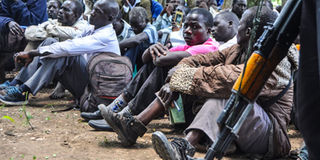Acholi lead negotiator on Apaa accuses Rugunda of failing talks

Attendance. Some of the affected Apaa locals attend a meeting with a six-member select committee of Parliament on Wednesday at Apaa Trading Centre. PHOTO BY JULIUS OCUNGI
What you need to know:
- The Cabinet memorandum stated that residents were to be given a package of Shs10 million, 20 iron sheets, 20 bags of cement and Shs2 million for those who do not have National Identity Cards.
The head of Acholi delegation in negotiations over Apaa land conflict, Dr Daniel Komakech, has accused the Prime Minister, Dr Ruhakana Rugunda, of compromising and failing the talks.
In August last year, President Museveni called for the formation of an eight-member committee from both Adjumani and Amuru districts to discuss the recommendations on ending the Apaa land impasse. The committee was headed by Dr Rugunda.
However, the different meetings held between September and December last year and chaired by Dr Rugunda failed to reconsider the Madi and Acholi positions on Mr Museveni’s earlier recommendations.
The Madi side dismissed the idea of degazetting the land saying there was alternative land elsewhere in Adjumani District to resettle the people while the Acholi side insisted that the land owners were not consulted while regazzeting the area in 2002 since they were in camps and should therefore continue to stay on the land.
While speaking to journalists in Gulu Town, Dr Komakech accused the Dr Rugunda of bias during the talks.
“During the talks, we made our submissions open to be debated and discussed but the premier could not compel the Madi team to do the same as agreed. To date, we don’t know what their propositions contain. Besides, he was too authoritative and kept making executive orders,” he said.
He said Dr Rugunda declined to visit Apaa to see the contested land when they requested and could not make orders to stop violence by the Madi people on Acholi in Apaa as well as clear roads of roadblocks by police in the area.
“We talked about violence in Apaa, we told him about unbearable difficulties the displaced people were facing, all he did was to smile and told us he would work on it despite reminders. He is a ‘yes man’ and that is not leadership. Two, the vulgarity and pornography of violence meted out on the people is unimaginable, but he did nothing,” Dr Komakech.
Dr Komakech, said Dr Rugunda’s address of Gen Moses Ali forced suspicion in them over his credibility to balance the two sides during the talks.

Accused: Dr Ruhakana Rugunda. Accusing: Dr Daniel Komakech
“To us, Gen Ali’s presence in the talks in all his capacities portrayed government as a coiling snake and that government seemed to marry with the Madi side during the talks. In the register, Gen Ali was there as an ordinary person but allowing him to switch sides during the talks was a sign that Dr Rugunda had failed to decide,” he added.
Later, Gen Ali was pushed out of the talks. It was reported that on the first day of the talks, Gen Ali came in his usual official convoy as an army officer and second deputy premier and sat among the government team.
However, when he returned in the second day to claim a seat among the Madi team, he was rebuked by the members.
Mr James Leku, one of the participants in the Apaa negotiation talks, disagreed with Dr Komakech that Dr Rugunda’s role failed the talks, saying it was Dr Komakech’s side that made unnecessary and strange demands.
“The talks failed to yield any fruits even if we sat a hundred times because it is unjustifiable to degazette a reserve to settle people when we have alternative land outside the reserve. Remember government already declared that Apaa is in Adjumani and Adjumani as a District has land to resettle its people, we cannot sacrifice the reserve,” he said.
Mr Leku, who is also the Adjumani District chairperson, said the demands by the Acholi team made it fail because they kept insisting on what neither Madi nor government side would accept.
The protracted Apaa land conflict has divided the Madi in Adjumani and Acholi in Amuru, resulting in violent confrontations between the two communities.
In February, Cabinet resolved to resettle victims of Apaa land conflict with building materials and money after assessing damages they have suffered.
The Cabinet memorandum stated that residents were to be given a package of Shs10 million, 20 iron sheets, 20 bags of cement and Shs2 million for those who do not have National Identity Cards.
A week ago, residents of Apaa rejected plans by government to compensate and relocate them saying it was their ancestral land while others said the money was too small to resettle them.
Mr Dan Kidega, a former East African Legislative Assembly legislator, who was part of the talks, told this newspaper that it is premature to conclude that the talks did not yield fruits because the assigning authority (President Museveni) is yet to issue a report in response.
“I am not ready to say the talks did not yield fruits, the President delegated us for the talks and I think we can agree to a failure or success depending on his response to the recommendations we put forward,” Mr Kidega said.
According to him, allowing the occupants of the contested land to coexist with wildlife would bring a solution to the conflict.
“We have put this option to President Museveni, with examples of Lake Mburo National Park and Masai-Mara Park in Kenya, that our people can also live there besides the animals,” he said.
On Tuesday, the Office of the Prime Minister (OPM) acknowledged the role played by premier Rugunda but declined to comment on the remark by Dr Komakech saying it was informal and unofficial.
Mr Julius Mucunguzi, OPM head of communications, said they cannot refer to or comment on the accusations against the premier unless it is put in writing.



